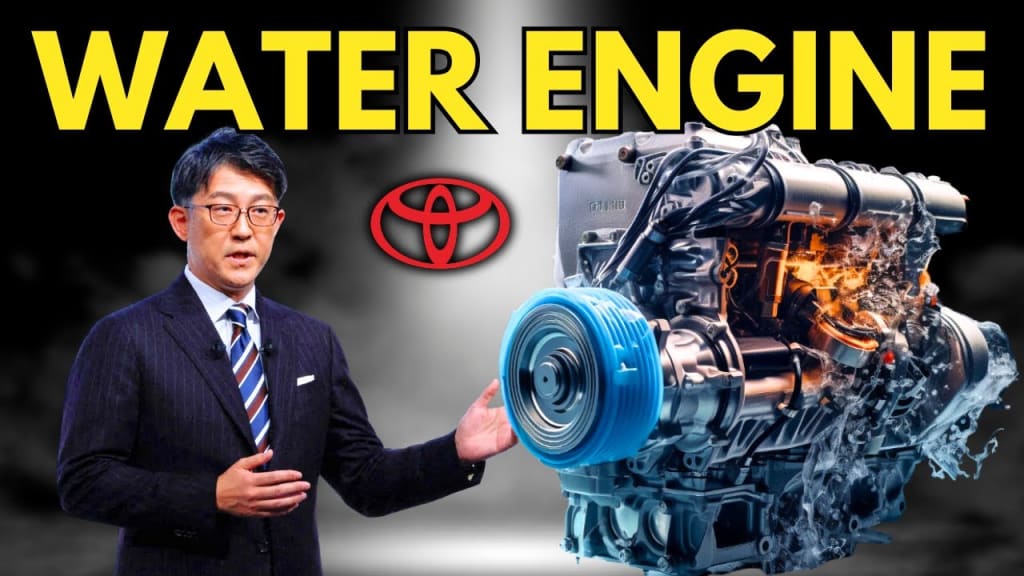
The game changing innovation would destroy evThe landscape of the automotive industry is poised for a historic transformation with Toyota’s introduction of a water-powered engine, a technology that could revolutionize our approach to eco-friendly transportation and potentially eclipse the current Electric Vehicle (EV) market.Innovation by Toyota
Toyota’s new engine leverages the principles of waterpower, a concept that has long been an aspirational goal in automotive engineering.
Unlike traditional engines or EVs, Toyota’s engine operates on a principle akin to the HHO generator but is uniquely tailored for vehicular use.processes water to extract hydrogen, which then powers the engine.
This method eliminates the need for heavy, high-pressure storage tanks as used in Fuel Cell Electric Vehicles (FCEVs) and hydrogen combustion engines.How Does the Water Engine Work?
The water engine operates on a process of electrolysis, where the H2O molecules in the water are split into hydrogen and oxygen. The engine utilizes electrodes placed in the water tank to emit high voltages, separating the hydrogen from oxygen. The hydrogen is then directed to the engine, where it combusts, powering the vehicle. Unlike traditional hydrogen combustion engines and fuel cell electric vehicles (FCEVs), which require heavily armored and expensive tanks to store compressed hydrogen, the water engine's hydrogen is contained within the water itself. This eliminates the need for extensive safety measures, making the engine simpler and safer to use. With these fundamental mechanics in mind, let's explore the environmental benefits of water engines.
Environmentally Friendly Benefits
The water engine promises to be an environmentally friendly alternative to both internal combustion engines and EVs. In terms of emissions, it is nearly zero compared to traditional engines, making it comparable to EVs. However, water engines offer greater convenience as they do not rely on external charging stations or long charging times. As long as there is access to diluted water, refueling the engine becomes a hassle-free and cost-effective process. Additionally, water engines reduce the extraction of oil and the need for rare metals like cobalt and lithium, which contribute to pollution during extraction. The engine's potential to minimize reliance on fossil fuels and reduce environmental harm is unparalleled. But how does it fare against hydrogen combustion engines and FCEVs? Let's find out.Toyota's Water-Powered Engine
Toyota's water-powered engine is a remarkable piece of engineering that utilizes a process called electrolysis to separate hydrogen from oxygen. Similar to the hydrogen combustion engine found in the Toyota Yaris grh2, the new engine processes and separates hydrogen and oxygen from water molecules. This separation occurs as the electrodes emit high voltages while immersed in the water tank. The hydrogen is then sent to the engine, where it combusts, similar to compressed natural gas engines. The overall functionality of the engine resembles that of CNG-powered engines, with slight adaptations to the fuel injectors, cylinder heads, pistons, and valves to accommodate the highly combustible nature of hydrogen. But what are the long-term benefits of this eco-friendly engine? Let's exploreLong-Term Benefits to the Environment
The introduction of water engines could lead to significant long-term benefits for the environment. By reducing the reliance on fossil fuels, these engines have the potential to drastically decrease carbon emissions. Heavy machinery and power production units might become the only sectors still reliant on fossil fuels if water engines become mainstream. Additionally, the need for extracting rare metals from the earth, such as cobalt and lithium, would be greatly diminished. This extraction process is currently polluting the surrounding water sources and soil, rendering areas uninhabitable. The environmental advantages of water engines are clear, but are they suitable for everyday use? Let's explore their usability.Social Impact:
The introduction of water engines could have far-reaching socio-economic implications. In regions with limited access to oil or underdeveloped infrastructure for electric vehicles, water engines could offer a viable, sustainable alternative. This technology could democratize access to eco-friendly transportation, providing a boost to economies and enhancing global efforts towards sustainable living.
Challenges
Despite its potential, the water engine technology faces several hurdles.
Past attempts at water-powered engines have struggled with reliability and daily usability.
However, a functional water engine has been built by an Iranian scientist Aladeen Kasemi, who successfully converted a Peugeot 405 to run on water. This demonstrates that with proper funding and development, water engines could be a viable alternative to traditional fuel sources.
Safety concerns due to hydrogen’s volatility also pose significant challenges.
Building on the legacy of their hydrogen-powered vehicles like the Mirai and the 1.6 hydrogen 3-cylinder engine, Toyota is taking a bold step forward. This engine isn’t just another iteration of existing technology but a radical departure towards a more sustainable future.





Comments
There are no comments for this story
Be the first to respond and start the conversation.